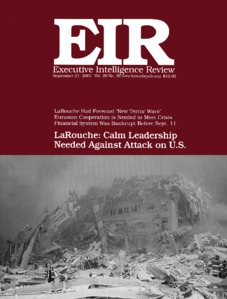LaRouche: Let Calm Heads Prevail To Stop Destabilization
by Lyndon H. LaRouche, Jr.
On Sept. 11, just at the very moment that news reports were first coming across the wires about the attacks against the World Trade Center and the Pentagon, 2004 Presidential pre-candidate Lyndon H. LaRouche was being interviewed by Jack Stockwell, morning radio host on K-TALK radio in Salt Lake City, Utah. To give citizens a sense of how a leader should respond to such a crisis, we reprint that interview.
Timetable of Events: Economic, Strategic Crises Collide, Sept. 11, 2001
The Press Cranks Up a Bush Flight Forward
‘Eurasian War Party’ Demands Bush Attack
by Mark Burdman
LaRouche, Sept. 13: The President Should Do What I Am Doing Now
by Lyndon H. LaRouche, Jr.
Lyndon LaRouche was interviewed on Sept. 13 by Mexican Radio ABC.
LaRouche Forecast ‘New Terror Wave’
by Jeffrey Steinberg
Economics
Global Financial System: It Was Bankrupt Before Sept. 11
by Lothar Komp
Worldwide, there is a state of financial emergency, an emergency that already existed before the attacks on New York and the Pentagon. The measures being taken to keep the system afloat, will only make the financial crisis worse.
U.S. Productive Employment Plunges to 1950 Levels
by Anita Gallagher and Richard Freeman
Test New Damming Method on Ohio River
by Marcia Merry Baker and Walter Merry
Don’t Gamble with Sunshine: South Korea Must Dump the IMF, Too
International
Eurasian Cooperation Is Needed To Meet the Crisis
by Mary Burdman
U.S. cooperation with Eurasian nations is crucial—for an economic recovery, and to clean out an irregular warfare capability threatening nations around the world.
How Western Policy Toward Palestine Has Spread ‘Jihad’ Throughout Eurasia
by Ramtanu Maitra
Russia Urges U.S.: No Flight Forward
by Jonathan Tennenbaum
Ariel Sharon and Israel’s Honor
by Theo Klein
A letter by Theo Klein, honorary President of the Representative Council of Jewish Institutions in France.
To Theo Klein, for the Sake Of Peace
by Jacques Cheminade
Mexicans Listen to LaRouche, as Fox Fumbles in Washington
by Valerie Rush
LaRouche: Mexico’s Economic Growth Is Vital to U.S. Security
by Lyndon H. LaRouche, Jr.
Mexico’s ABC Radio interview with Lyndon LaRouche, Sept. 6.
LaRouche: How To Defend Macedonia
by Lyndon H. LaRouche, Jr.
Diaspora Returns, for Macedonia’s Sovereignty
by Umberto Pascali
Macedonia Official: NATO Is Sending a Bad Signal to Terrorists Worldwide
An interview with Emilija Geleva.
National
U.S. Inundated by Media Myths in Wake of Sept. 11 Attacks
by Paul Gallagher
At a moment when calm leadership was urgently needed from national elected officials and citizens alike, the United States was inundated, in the days after Sept. 11, with dangerous media myths. The most blatant and dangerous—that “terrorist attacks are now going to cause a recession, from which a new patriotism will cause a recovery”—was everywhere.
The Case of the Clone Prince: Who Is the Next King of England?
by Lyndon H. LaRouche, Jr.
‘Faith-Based’ Scam To Replace Welfare?
by Marianna Wertz
Faith-Based Initiative Won’t Solve the Problem
Interviews with Peter Edelman and Joseph M. Neal, Jr.
Temple Mount Nut Woos Christian Fundies; Threatens Sharon and Bush
by Harley Schlanger
Congressional Closeup
Interviews
Emilija Geleva
Emilija Geleva has been the Strategic Affairs adviser to the government of the Republic of Macedonia for the last three years, during the most tumultuous period of the ten-year-old republic.
Peter Edelman
Dr. Peter Edelman, a professor at Georgetown University Law Center in Washington, D.C., was an Assistant Secretary of Health and Human Services during the first Clinton Administration. He resigned from that position in 1996, in protest of President Clinton’s signing of the welfare reform legislation.
Joseph M. Neal, Jr.
Nevada State Sen. Joseph M. Neal, Jr. (D-N. Las Vegas) warns that the private agencies will not be able to take care of those in need.
Departments
Editorial
What Should You Do?



